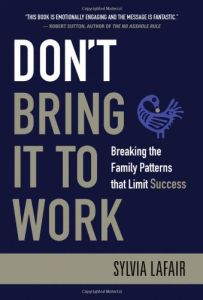Join getAbstract to access the summary!

Join getAbstract to access the summary!
Sylvia Lafair
Don't Bring It to Work
Breaking the Family Patterns that Limit Success
Jossey-Bass, 2009
What's inside?
You carry your family history around, but you don’t have to take your baggage to work.
Recommendation
It’s your first day on your new job, and you’re meeting your new colleagues. You shake hands, make eye contact and offer a pleasant smile. But for some reason, you instinctively don’t like one or two people; they make you uncomfortable. How is it possible to judge people whose names you don’t even know? Therapist and relationship expert Sylvia Lafair believes that the seeds of workplace conflict are rooted in your family background. She posits that the behaviors modeled in your childhood and your relationship with your family members create subliminal expectations that you subconsciously project onto others, including strangers. Lafair suggests that understanding your upbringing is the linchpin to avoiding and resolving workplace conflict. The author offers profound, detailed insight into the psychological dynamics that govern interpersonal relationships. Recognizing your family patterns is just the first step, though; the real work lies in your willingness to change your behavior. Though Lafair’s approach may not resonate with everyone, getAbstract recommends her book to managers and employees who wish to avoid perpetuating destructive cycles of workplace conflict.
Summary
About the Author
Sylvia Lafair, a former family therapist, is president of Creative Energy Options, Inc., a consulting firm that addresses conflict resolution and leadership issues.
















Comment on this summary